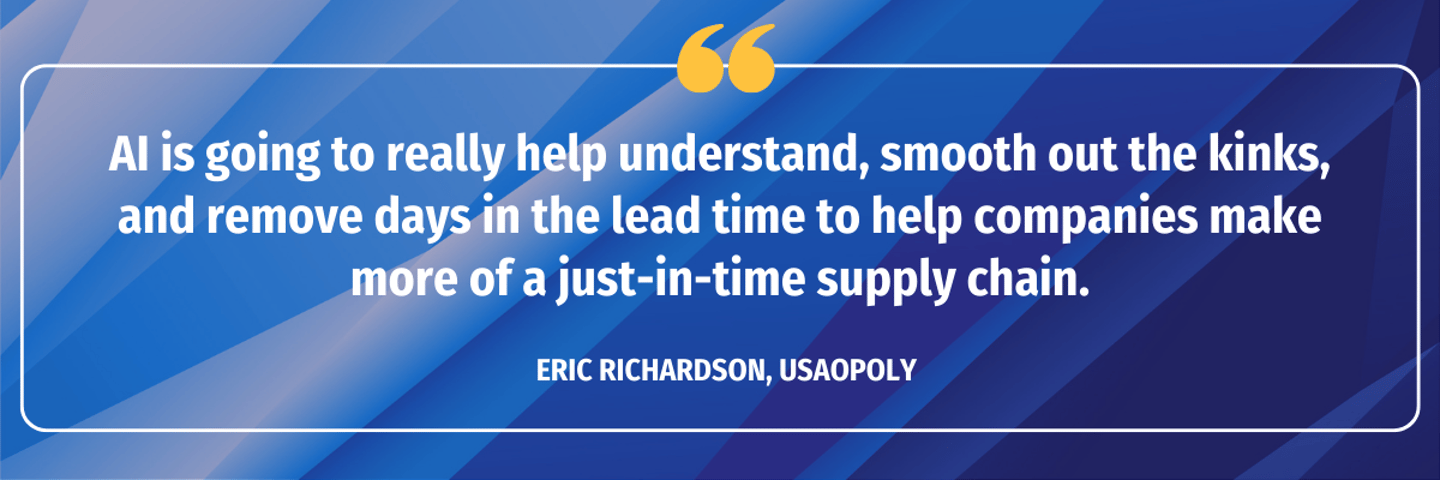What is the Future of AI in Logistics?
AI in the supply chain is becoming a more common solution within the consumer goods’ toolbox, including within logistics. In fact, 19% percent of consumer goods executives cited logistics optimization as a top use case of AI and machine learning in the CGT?RIS Retail and Consumer Goods Analytics Study.
To be sure, the future of AI in the supply chain holds great promise for the companies that can successfully see their investments through.
How artificial intelligence is used in supply chains
The myriad uses of artificial intelligence in logistics and the supply chain are all bound by a common thread to increase efficiency, reduce waste, mitigate risk, and identify new opportunities, including within warehouse management, fulfillment and delivery optimization, sourcing, customer service, and more.
“AI is enabling businesses to have added intelligence and incremental predictions into their supply chains. While planning and forecasting were instrumental prior to the pandemic, recent developments in AI have dramatically enhanced these capabilities,” says Manish Ghosh, corporate VP, industry strategy, consumer industries at Blue Yonder. “Companies are leveraging AI to predict item returns, supplier reliability, consumer price elasticity, labor needs, and much more. Generative AI is serving as a trusted, intelligent co-pilot to brands, helping augment their decision-making and problem-solving.”
Within logistics, AI can improve operations by quickly integrating data from disparate sources so leaders can make decisions surrounding demand, fulfillment, and transportation more quickly. Upon applying predictive analytics, the benefits of AI in logistics include forecasting likely outcomes.
Future of AI in logistics
The applications of artificial intelligence within consumer goods logistics are varied, and the future of AI in logistics promises great potential to help companies improve business outcomes. Fifteen percent of retailers and consumer goods manufacturers said in a November 2022 EnsembleIQ study that they had implemented AI or ML to support their supply chain functions, while an additional 16% planned to add it in the next year or two.
Eric Richardson, manager of forecasting and data analytics at board game manufacturer USAopoly, believes that logistics will be a significant recipient of the benefits of AI in the supply chain. “There's going to be better end-to-end optimization of lead times from the point when someone purchases something overseas to when it gets to their warehouse,” he says. “AI is going to really help understand, smooth out the kinks, and remove days in the lead time to help companies make more of a just-in-time supply chain.”
Within the retail supply chain, companies would be well-served to implement AI/ML models to increase insight, scalability, and agility, advises Jordan Speer, IDC research director of product sourcing, fulfillment, and sustainability. This will in turn decrease the amount of time required to make a decision and provide the company with a competitive advantage.
Implementing predictive analytics to optimize demand planning, inventory placement, workforce planning, and task management will help logistics teams identify risks and proactively manage resources and mitigate problems, she noted. This includes eliminating reliance on carbon-intensive last-mile delivery methods during unexpected demand spikes and instead continuously evaluating supply chains for optimal use of resources, says Speer.
AI in logistics examples
Within consumer goods logistics, artificial intelligence can be used to optimize route planning and warehouse fulfillment operations. In doing so, companies can not only reduce their emissions and further advance their sustainability goals, but they can also decrease labor costs and improve customer service levels.
AI in logistics examples includes Kimberly-Clark’s deployment of ProvisionAI’s platform across all North American operations. The consumer goods company wanted to reduce “order bunching,” which is when order loads stack up on certain days of the week. This can negatively impact both on-time delivery and labor, among other things. The company leveraged artificial intelligence to automate its distribution planning and deployment process, and, in doing so, was able to connect disparate systems and receive easier-to-execute recommendations.
As part of this, Kimberly-Clark received greater visibility into where it was underutilizing the cubic intensity of its trailers, and its distribution and customer service teams were provided with the ability to be more proactive. The AI-fueled platform helped the company reduce variability daily by 40%, particularly in locations where production plants are shipping to its distribution centers. As one piece in a delivery shifts, Kimberly-Clark employees can now better anticipate potential problems with each adjustment, including ensuring that any deployment move aligns with inventory targets and lead times.
All of this has substantially improved on-time delivery and customer service performance, and reduced North American distribution costs by several million dollars, according to Scott DeGroot, Kimberly-Clark VP of global logistics.
How generative AI can drive supply chain transformation
In looking at the future of logistics, it’s impossible to not examine one of the most talked-about technologies: generative AI. Though still emerging, generative AI carries great potential across nearly all business functions, including the CPG supply chain.
“When embedded into the enterprise digital core — which includes cloud, data, security, and machine learning — generative AI has the ability to transform and optimize tasks, manage data, create faster insights, innovate with new experiences, augment workers, and connect and communicate with customers and consumers,” says Adheer Bahulkar, global supply chain lead of Accenture’s consumer goods and industry practice.
Indeed, container shipping company Maersk seeks to use generative AI to recommend solutions for congested shipping routes, as well as provide a deeper understanding of its sales process, according to CNBC.
Sanjeev Siotta, CTO at warehouse management systems (WMS) provider Manhattan Associates, sees potential for generative AI — specifically ChatGPT — to help configure a WMS. By training the bot with all possible inventory and distribution configurations, retail supply chain managers could quickly receive custom views of inventory and customer shipment scenarios.



